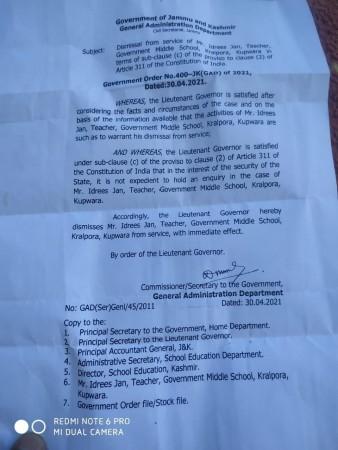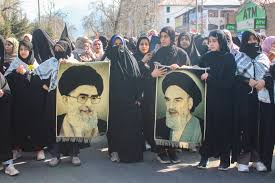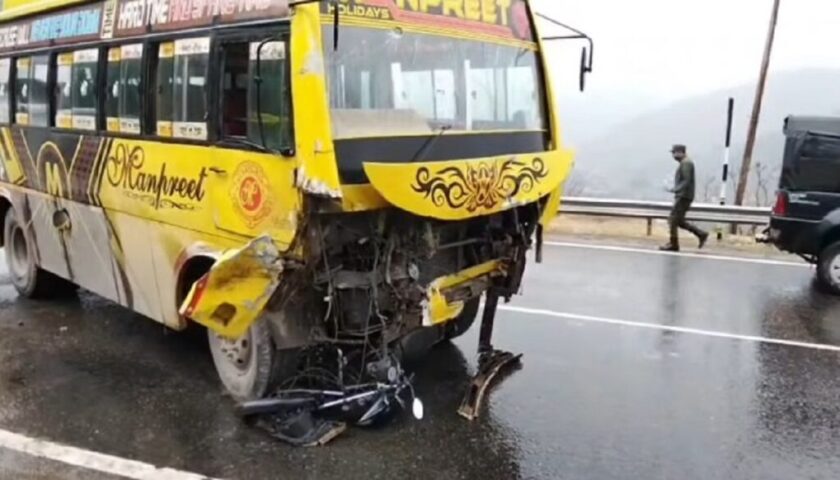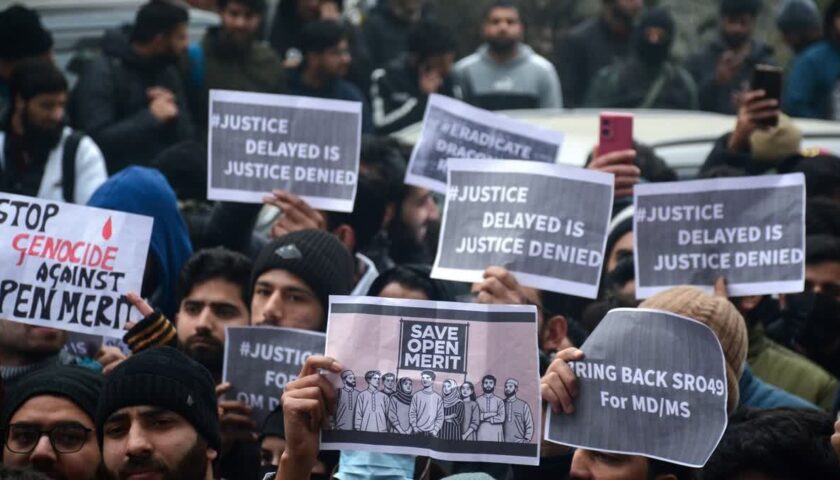A Broad Stroke in a Wider War
By: Javid Amin | 30 Ootober 2025
In a significant move reflecting the deepening security imperatives in the Union Territory of Jammu and Kashmir (J&K), the administration headed by Manoj Sinha, the Lieutenant Governor, has dismissed two government school teachers for alleged terror links. This decision, taken under the constitutional provision of Article 311(2)(c) of the Indian Constitution, underscores a zero‐tolerance approach toward any infiltration of terror-support networks into the state’s institutions.
On October 30, 2025, official sources confirmed that the two teachers—Ghulam Hussain (Reasi district) and Majid Iqbal Dar (Rajouri district) — were dismissed after intelligence and law-enforcement agencies alleged that they were acting as Over-Ground Workers (OGWs) and facilitators for the proscribed terror group Lashkar‑e‑Taiba (LeT).
This article will unpack the event in depth—who the individuals were, what the charges entail, how the legal mechanism (Article 311) works in this context, and the broader implications for governance, education and security in J&K.
The Employees — Who They Were
01. Ghulam Hussain: From Rehbar-e-Taleem Teacher to Alleged OGW
According to official sources, Ghulam Hussain was appointed in 2004 as a Rehbar-e-Taleem (ReT) teacher and was regularised in 2009. He was posted at Government Primary School, Kalwa, Mahore in the Reasi district.
Authorities allege that he functioned as an Over-Ground Worker for LeT, maintaining encrypted communications with militants, facilitating recruitment, handling terror funding, and coordinating logistics for the terror network in and around Reasi. The evidence reportedly shows he was in contact with known LeT operatives such as “Mohd Qasim” and “Ghulam Mustafa” and was receiving funds which he distributed to families of terrorists or used for recruitment.
What makes the case particularly striking is the dual role he played: on paper a government teacher, on the ground allegedly part of a terror ecosystem. Sources emphasise that the threat of having an OGW embedded in the education system is “magnified” because of the vulnerability of young minds and the trust invested in teachers.
02. Majid Iqbal Dar: Lab Assistant Turned Teacher – Alleged Narco-Terror Links
Majid Iqbal Dar started his career in the School Education Department of J&K as a Laboratory Assistant in 2009 (appointed on compassionate grounds after his father’s death) and was later promoted to the post of teacher in 2019.
He is alleged to have acted as an OGW for LeT, but with an additional dimension: involvement in narco-terror activities—that is, the use of drug-trafficking networks to finance or support terror operations. In the case described, he was connected to an IED recovery near a bank in Rajouri, and investigations reportedly revealed his role in channeling funds derived from narcotics to terror operatives.
According to reports, the investigation found that even while in detention he continued to display radical tendencies, making his case all the more alarming from a security-perspective.
03. Verification and Key Facts
The information has been corroborated in multiple media reports:
-
The dismissal under Article 311 was confirmed for both individuals.
-
The roles attributed (OGW, recruitment, funding, encrypted messaging) appear across sources.
-
The broader scheme that over 80 government employees have been dismissed in the last five years under this policy in J&K was also reported.
While the detailed case files remain confidential (as is typical for national-security cases), the public disclosures are consistent and reflect a pattern rather than a one-off.
Grounds for Termination — Legal and Administrative Mechanisms
01. Understanding Article 311(2)(c)
Article 311 of the Constitution of India sets out conditions under which certain civil servants may be dismissed or removed. Specifically, the relevant clause here is:
“(2) Where the charge or complaint against a person serving in civil capacity in relation to the affairs of the Union or of a State is of such a nature that it is not reasonably practicable to hold an inquiry, the President or the Governor, as the case may be, may … (c) … order his removal, if he is of the opinion, after considering the circumstances of the case, that in the interest of the security of the State it is not expedient to hold such inquiry.”
In short, Clause (2)(c) allows for summary dismissal — without a departmental enquiry — when the competent authority believes that an inquiry cannot be held for reasons of state security.
In this instance, the J&K administration has invoked Article 311(2)(c) to dismiss the two teachers. The official rationale is that their alleged involvement with terror networks, and active support to those networks, constitutes such a threat that a normal inquiry cannot proceed.
02. Why Use Article 311(2)(c)?
There are distinct reasons to use this provision in such cases:
-
Speed & Confidentiality: Terror-linked investigations often involve intelligence inputs, covert communication, encrypted channels and operational secrecy. A full departmental inquiry might risk exposing sources or methods.
-
Risk to institutional trust: When the alleged actor holds a position of public trust (such as a teacher), the delay or failure of formal inquiry might undermine public confidence.
-
Preemptive security: If the subject continues to pose a threat (e.g., radicalising youth, funding recruitment), then sidelining them immediately may be the prudent course.
In the J&K case, officials argue that permitting the two to continue (even as suspended employees) would create unacceptable risk — hence the summary action.
03. Procedural Safeguards and Due-Process Concerns
While Article 311(2)(c) empowers summary dismissal, it also raises legitimate questions about due process and fairness:
-
Right to show cause: Typically, a government servant may be given an opportunity to present a defence or explanation. The use of Clause (2)(c) bypasses a full inquiry.
-
Burden of proof & transparency: Since much evidence may be classified (for security reasons), the dismissed employee may not be able to contest or rebut publicly.
-
Presumption of innocence: In administrative law, a public servant often retains some protections until proven wrong. Critics argue that summary dismissal may invert this presumption.
In J&K, opposition parties and even legal commentators have pointed out that while security concerns are real, the lack of visible transparency can erode faith in institutional fairness.
04. The Administration’s Rationale
From the administration’s viewpoint, this is part of a broader strategy:
-
To send a clear message that ideological, financial or logistical support to terrorism from within state institutions will not be tolerated.
-
To cleanse the education and public service sector of latent threats that could undermine youth, social cohesion and state legitimacy.
-
To complement kinetic security operations with administrative measures—recognising that terror-ecosystems operate not only through gunfire but through networks of money, recruitment, radicalisation, grey-literacy and infiltration of institutions.
As Lt Governor Manoj Sinha said (in publicly reported remarks): “The war against terrorism is not over and a lasting peace can only be achieved by completely dismantling the terror ecosystem.”
The Broader Context — Terror Ecosystem in J&K and Institutional Infiltration
01. Historical Background: J&K’s Evolving Security Landscape
For decades, Jammu & Kashmir has been the site of insurgency, cross-border tensions, militancy and counter-insurgency. Over time, the theatre of conflict has evolved: from overt armed clashes to sleeper cells, radicalisation via social networks, narco-terror links, and over-ground workers embedded in civilian sectors.
The proscribed group LeT remains a serious actor in this region, responsible for numerous attacks, infiltration attempts and recruitment drives. Institutions—especially schools, local government offices and public services—have at times been vulnerable to infiltration or ideological capture.
02. From Gunfire to Grey-Zones: OGWs, Recruitment and Radicalisation
The concept of an Over-Ground Worker (OGW) is central here: an individual who may outwardly appear to be a normal civilian or state employee, but supports terror groups through logistics, finance, recruitment or propaganda. In many cases, the OGW role is less visible than an active combatant, yet vital to sustaining the terror network.
In the case of Ghulam Hussain, the allegation is precisely that he served as an OGW — maintaining encrypted communications, receiving terror-funds, distributing them for recruitment and supporting families of militants. These are core components of the non-kinetic dimension of terrorism: radicalising youth, sustaining the network, undermining loyalty to the state from within.
Similarly, Majid Iqbal Dar is accused of narco-terror links — that is, the trafficking of narcotics to fund terror operations, radicalise youth and supply logistics for militant activity. The presence of such actors within ostensibly benign institutions (education department) is especially troubling for governance and social trust.
03. Institutional Infiltration: Why Education Gets Targeted
Schools and teachers play a pivotal role in shaping societal values and young minds. A teacher is trusted, wields influence and can subtly shape narratives. A state’s education system is a site of ideological battle. If the state cannot ensure the loyalty and integrity of its educators, the consequences go beyond isolated security threats — they impact social cohesion, trust in institutions and the very project of democratic citizenship.
In this regard, the fact that both dismissed individuals were teachers (or formerly lab assistants-turned teachers) makes the case especially symbolic: it signals that even the education sector is not immune from the infiltration of terror-support networks.
04. Zero-Tolerance Policy: Scale and Signals
The dismissals of these two teachers do not occur in isolation. Reports cite that over 80 government employees have been terminated over the past five years under this policy in J&K.
This volume suggests a sustained campaign, not just sporadic action. The message is clear: the administration is seeking to cleanse the public-service domain of any individuals whose loyalty is questionable or whose role is undermining state security.
At the same time, the policy raises questions about oversight, fairness, filtering mechanisms and rehabilitation (for individuals wrongly accused or for those radicalised). This duality—security vs justice—is the hallmark of conflict-region governance.
Detailed Breakdown of the Two Cases
01. The Case of Ghulam Hussain – Reasi District
Timeline and Appointment: Appointed in 2004 under Rehbar-e-Taleem scheme; regularised in 2009; posted to Government Primary School, Kalwa, Mahore (Reasi).
Allegations:
-
Acting as OGW for LeT.
-
Maintaining encrypted communications with known LeT operatives such as Mohammad Qasim and Ghulam Mustafa, who acted as his handlers.
-
Receiving terror-funds via local conduits, distributing money for recruitment, logistics and supporting families of known terrorists.
-
Networked with other OGWs operating in the Reasi region, tasked with radicalising youth and strengthening the terror infrastructure.
Significance: The alleged role occupies a critical junction: an educator covertly aiding recruitment and financing for a terror outfit. That dual role amplifies the risk: young students, families and the larger community are at stake. The narrative of loyalty is compromised.
Institutional and social impact:
-
The breach of trust: parents entrust teachers with children’s development. Having a teacher allegedly involved in terror support shakes that confidence.
-
The ripple effect: Even one compromised educator can influence many children, especially in rural, vulnerable regions.
-
Operational threat: Through his role, Hussain allegedly became a node in the terror-eco-system — conduits, encrypted messaging, fund flows — that could enable attacks, recruitment and destabilisation.
02. The Case of Majid Iqbal Dar – Rajouri District
Background and Appointment: Dar began as a lab assistant (2009) in the School Education Department, was appointed on compassionate grounds following his father’s death, and later promoted to teacher in 2019.
Allegations:
-
Functioned as an OGW for LeT; involved in radicalising youth in Rajouri and surrounding areas.
-
Involved in narco-terror: The investigation reportedly showed that Dar used drug money to finance terror operations, making him part of the hybrid nexus of drug-trafficking and militant funding.
-
Connection to IED recovery: Police reportedly recovered an Improvised Explosive Device near a branch of J&K Bank in Rajouri; investigations implicated Dar, alongside LeT operatives and Pakistani handlers.
-
Even during his detention, Dar is believed to have maintained radical leanings and influenced other inmates.
Significance: The Dar case represents an escalation in complexity — not just ideological or recruiting work, but the blending of narcotics, terror finance, explosives and institutional infiltration. The embedding of such an operative in the education department raises deeper issues about screening, supervision and institutional resilience.
Implications and Stakes — Political, Legal & Social
01. Governance and Institutional Integrity
The dismissals send a strong message: Government institutions, whether education, health or services, cannot serve as safe havens for subversive elements. Maintaining the integrity of public service is fundamental to state function and trust.
For J&K, which is undergoing a transition in governance (post re-organisation, demography shifts, digital governance), any slack in public-service integrity could have disproportionate consequences. Teachers, in particular, are key agents of socialisation and civic formation. If ideological subversion enters these spaces, the long-term costs are high.
02. Security and Counter‐Terror Strategy
From a security-strategy perspective, the move reflects an understanding that insurgency and terrorism no longer operate only via jungle wars or cross-border infiltration. They operate through networks, grey-zones, civil-society proxies, narcotics, recruitment, radicalisation—often via institutions.
The two cases show that teachers, normally considered benign actors, can be vectors of a terror-ecosystem if their allegiance shifts. By removing such individuals, the state aims to cut off inner links, reduce radicalisation potential, and foster safe institutional environments.
03. Legal and Rights Dimensions
While security is paramount, the use of Article 311(2)(c) raises questions:
-
Does the lack of formal inquiry undermine fairness and transparency for the respondent?
-
Are sufficient safeguards in place so the process cannot be misused?
-
How are innocent employees protected from wrongful dismissal?
Opposition voices and legal scholars argue that summary dismissals erode due-process norms — especially when full evidence remains classified. For a democratic system, striking the right balance between security and rights is a perennial challenge. Reports quoting opposition parties highlight this tension in J&K.
04. Social Cohesion, Education & Youth
Teachers influence the next generation. When a teacher is removed for terror-links, the impact resonates across the community: trust is eroded, suspicion spreads, and the education ecosystem faces reputational risk.
Moreover, radicalising youth is a key objective of militant networks. By placing sympathisers in teaching roles, the terror outfits attempt to influence young minds when they are most impressionable. The J&K administration’s action therefore has significance beyond mere job termination—it is a step to protect the educational environment from ideological capture.
05. Message to the Terror Ecosystem
Ultimately, the action communicates a deterrence signal: No one is above scrutiny—even public-servants. The logic is that terror networks rely on institutional cover, recruitment lines, logistic channels and institutional legitimacy. By attacking these lines, the state aims to squeeze the terror ecosystem from within.
Lt Governor Sinha’s remarks underline this: “War against terrorism is not over … Kinetic and non-kinetic operations must continue … We must maintain the momentum and take stringent action against terrorism and its entire ecosystem.”
Critique and Caution — What to Watch
01. Ensuring Fairness and Avoiding Over-reach
While the need for summary action is understandable in security contexts, safeguards remain essential:
-
Clear and credible evidence: The dismissed employee should have access to some procedural redress, even if the inquiry is classified.
-
Transparent criteria: The basis for summary dismissal must be consistently applied, to avoid perception of arbitrariness or politicisation.
-
Appeals or review mechanisms: Even if formal enquiry is not practical, some mechanism of review could enhance legitimacy.
-
Protection of innocent staff: The risk of false or mis-implemented allegations erodes morale and trust in institutions.
02. Addressing Root Causes of Radicalisation
Termination of individuals is a necessary step but not sufficient. The bigger challenge is preventing radicalisation, recruitment and financing in the first place:
-
Robust screening of government employees, especially in sensitive roles.
-
Training, awareness programmes in schools to spot signs of radicalisation or external influence.
-
Youth outreach, alternative narratives, community-engagement to reduce susceptibility to extremist ideologies.
-
Tackling the drug-terror nexus and providing socio-economic opportunities in vulnerable districts.
03. Monitoring Institutional Resilience
The education system in J&K must not only survive these shocks but must become more resilient:
-
Support mechanisms for teachers to maintain professionalism and resist ideological pressures.
-
Systems of oversight that identify early signs of subversion.
-
Trust-building with communities, so that parents and local bodies feel confident in the safety and neutrality of schools.
04. Political and Regional Sensitivities
In a region already marred by conflict, any dismissals of public servants carry political weight. Some potential problem-zones:
-
Perceptions of targeting specific communities or beliefs. The administration must ensure decisions are based solely on credible evidence, not communal or political bias.
-
Communication and narrative: The administration must explain to local stakeholders the reasons, safeguards and future plan, so that actions are understood not as arbitrary repression but as necessary security steps.
-
Feedback loop: Over-reliance on summary dismissals without transparent systems might exacerbate alienation or undermine the very goal of peace and integration.
Looking Ahead — What This Move Means for J&K
01. Consolidating the Education Ecosystem
The dismissal of two teachers for terror-links compels the education department and the state to re-evaluate systems: recruitment, periodic monitoring, background-checks, and ideological screening. It may prompt:
-
Tighter rules around teacher appointment and regularisation in conflict-affected regions.
-
Increased collaboration between education and security/intel-agencies to flag high-risk individuals.
-
Awareness training for school administrators and district officials in detecting early signs of radicalisation or subversive behaviour.
02. Strengthening Non-Kinetic Counter-Terror Measures
In modern counter-terrorism strategy, the non-kinetic front (financial flows, recruitment, radicalisation, infiltration) is as vital as the kinetic front (guns, operations). This decision is part of that broader shift. For J&K, this means:
-
Greater emphasis on intelligence-led administrative action.
-
Use of institutional levers (public-service termination, student-outreach, teacher vigilance) alongside armed operations.
-
Disrupting narcotics‐terror links, over-ground worker networks, radicalisation pipelines.
03. Maintaining Momentum While Safeguarding Rights
For the policy to remain credible and sustainable, the administration must:
-
Continue taking decisive action where evidence is strong.
-
Maintain transparent criteria and communication to avoid backlash or alienation.
-
Consider institutional mechanisms for fairness—though full inquiry may be impractical in all cases, some process of redress or review builds trust.
-
Engage with civil society, teachers’ unions, parents and local communities to build shared ownership of the security turn.
04. Signal to Other Regions & Institutions
The case in J&K may serve as a model (or cautionary tale) for other conflict-prone states or regions where terror networks attempt to infiltrate institutions. The lessons include:
-
Institutions matter: Terror groups aim not just at battles but at social influence, ideological erosion, recruitment.
-
Public-service integrity is a frontline: When teachers, clerks or labs assistants become nodes of influence, institutional legitimacy is threatened.
-
Administrative and legal tools exist but must be used with safeguards: summary dismissals must balance security with fairness.
Conclusion — The Stakes Are High
The dismissal of two government school teachers in Jammu & Kashmir under Article 311(2)(c) for alleged terror-links is far more than a personnel move. It is a symbol of how the state’s fight against terrorism is branching beyond the battlefield and into the halls of schools, into the classrooms, into the fabric of everyday governance.
If indeed the allegations stand up to scrutiny—and available information suggests credible intelligence evidence—then this may be a necessary step to safeguard not just security, but the integrity of institutions that shape young minds. But the challenge ahead is equally formidable: ensuring that the system is resilient, trustworthy, fair and preventive rather than purely reactive.
Success in this domain requires more than sackings. It requires institutional reform, better screening, rigorous oversight, community engagement, youth outreach, ideological counter-narratives and a transparent, rights-respecting governance structure.
For the people of J&K, especially parents, students and teachers, the message is clear: the education environment must remain neutral, safe and above subversive influence. For policymakers, the message is that the war against terrorism has moved deeper—into classrooms, into recruitment cells, into system-loopholes—and must be fought accordingly.
In the words of the Lieutenant Governor: “We must maintain the momentum and take stringent action against terrorism and its entire ecosystem.” The next test will be sustaining that momentum—with fairness, transparency and long-term institutional health resting firmly alongside immediate security.




